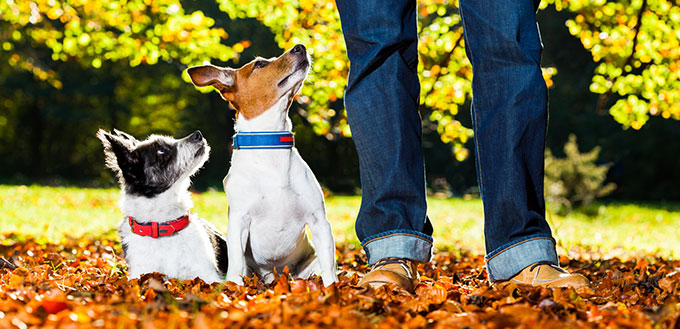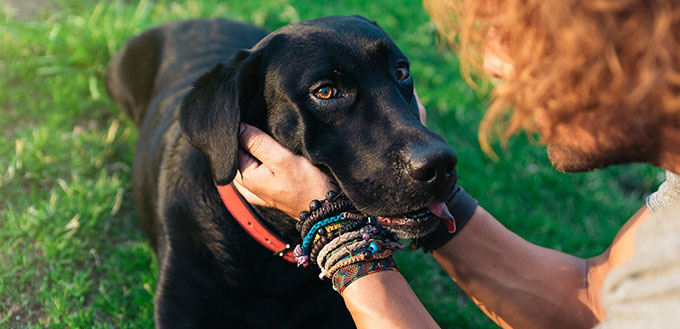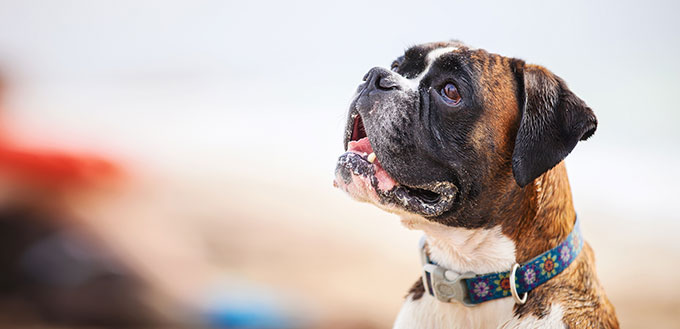As humans, there’s no denying that eye contact is important to us. Whether we’re delivering unfortunate information to a stranger or looking into a loved ones’ eyes as we tell them how much they mean to us, holding eye contact is an important part of communication. But what about eye contact with dogs?
If you’ve ever found yourself in a staring contest with dog friends or simply end up holding eye contact with dogs, you may find yourself wondering whether looking a dog in the eyes is a good thing. Below, we’ll discuss everything there is to know about eye contact with dogs and why, just like humans, there are so many variations as to whether this is a good or bad thing.
Why Does My Dog Stare Into My Eyes?
As with humans, there are multiple reasons as to why a dog might stare into your eyes. Figuring out the reasons why often comes down to their overall body language, but the main reasons why you might be getting in a staring contest with dogs could be one of the following:
- Asserting dominance
In the same way that humans may use their gaze to intimidate others, dogs are known for asserting their dominance by staring down their opponent. In these cases, the other dog may avoid the gaze of the dominant dog, so that the staring dog know that the intimidated pup has submitted. In this sense, your dog may be asserting their dominance over another pup – and sometimes trying to assert their dominance over you.
That is why, when you see a dog you don’t know, it’s important not to hold eye contact with the unknown animal that is trying to assert their dominance over you. If you do continue staring back at the dog, they may see you as a threat and begin attacking.
- Waiting for a command
Dogs will often look to their owners for cues on how to behave next. More often than not, if you and your dog have a particularly close bond, your dog will look into your eyes in order to sense what their next move should be. This is great for training and eye contact is always encouraged when it comes to working with your pup.
- Showing interest
Some dogs will often make eye contact with other dogs in order to show that they are interested in playing with them. In these cases, the body language of the dog will be softer, and often comes with a pose that indicates their playful nature, such as throwing the front half of their body to the ground while their rear end remains in the air.
- Showing affection and respect
If you and your dog know each other well, it could be that their desire to lock eyes with you is simply a sign of love. You will usually be able to tell when this is the case, as your dog will likely be lying near you, and they may wag their tail when you lock eyes. This is simply their way of showing that they love you and are happy to be near you.
Do Dogs Like Eye Contact
The answer to this is slightly more complex than a simple “yes” or “no”. Indeed, it mostly depends on how comfortable they are in their current situation and whether they know the person or animal they are attempting to lock eyes with.
In humans, dogs will lock eyes with loved ones for reassurance, help or affection. However, if you are a relatively unknown entity, it can simply be that the dog is attempting to decide whether or not you are a threat to them and they will often meet your gaze in an attempt to establish dominance, so as to give you time to register the threat and back away, before a fight is required.
If you find yourself in this situation, it’s important to avoid eye contact with the unknown dog, move away with your shoulders facing at an angle to (as opposed to squarely facing) the dog and speaking in a soft voice. All of these should let the dog know that you are not seeking a fight, nor are you a threat to them.
Why Does My Dog Avoid Eye Contact?
A dog will usually avoid eye contact with you, in order to let you know that they are submitting to you. You might notice that a dog will avoid eye contact when they have done something they shouldn’t, and you are telling them off. For example, if you’ve caught your pup eating something they shouldn’t, and you point to the empty bowl or packet while firmly saying “no” or “what’s this?”, you’ll notice that your dog will put their head down, look away and give their tail a low wag. This is their way of telling you that they are sorry and are submitting.
Eye Contact and Training
Looking a dog in the eyes is a great way of ensuring that your dog is listening to you and attentive to your commands. When you have steady eye contact with dogs, it means they are listening out for their next command. Teaching your dog to make eye contact is therefore a great way of encouraging certain movements in training.
You may also like our article on: Why Do Dogs Wink?
Teaching Your Dog to Make Eye Contact
Training with your dog is much easier for puppies, but getting the right bond with older dogs can help them to come on leaps and bounds in training and one way of encouraging this is through eye contact. Whether your dog is old or young, use the following method to encourage eye contact when training:
- Get your dogs attention by calling them or making an interesting sound, if they aren’t sure of their name yet.
- Hold a treat and let them know that you have a treat for them by letting them smell it or see it – but do not give the treat to them, yet.
- Hold the treat near to your face.
- When your dog looks you in the eyes, give them the treat immediately.
- Repeat these steps, but use a specific command when holding the treat to your face. This will help your pup realize that their attention – and therefore their eye contact – is required. Something along the lines of “watch” should be a good, clear, simple command that helps you dog look at your eyes.
Related Post: Dog Safe Peanut Butter Treats
Sources:
- Pat Miller, CBCC-KA, CPDT-KA, Teach Your Dog to Make Eye Contact, Whole Dog Journal
- Jill Fanslau, Dog Staring: Everything You Want to Know, PetMD
- Mikkel Becker, Why Won’t My Dog Look Me in the Eye?, VetStreet










